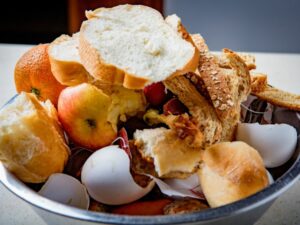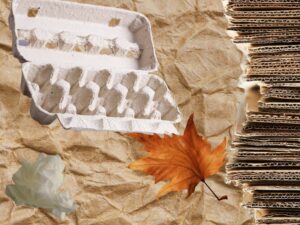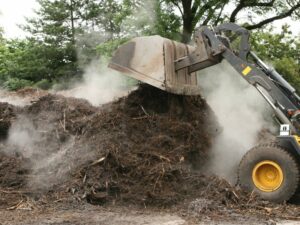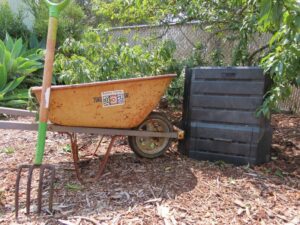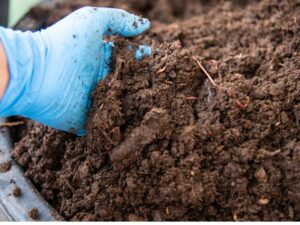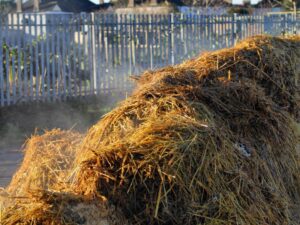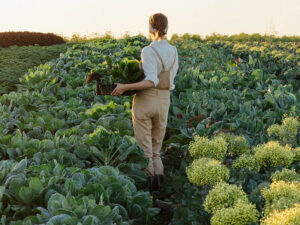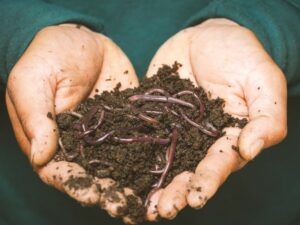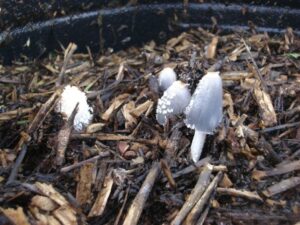Traditional compost
San Diego County wastes 500,000 tons of food each year. Here’s a better solution.
Originally published in San Diego Union-Tribune February 17th. Written by Jessica S. Toth, Solana Center Executive Director. Government and economics are coming into alignment on the need to address climate change. In the past few weeks, climate change mitigation was hot. The San Diego County Board of Supervisors identified activation around climate policy as a key platform tenet,…
Read MoreFrom the Rotline: What “browns” can I use in my compost?
Rotline Question: Can I make a traditional compost pile with paper as my only “browns” material? What else can I use? Answer: Making a traditional compost pile with paper as your only brown is doable, but not optimal. In order for the materials of your compost to break down efficiently, a sufficient amount and balance of nitrogen…
Read MoreBenefits of Compost and Mulch on Fire-Damaged Land
2020 has become the largest wildfire season recorded in California’s modern history as wildfires have devastated many parts of state this year. As of October, 4,267,386 acres have burned so far and we’re still not quite in the clear yet. We are all looking to the coming months to bring much-needed rainfall for our state, allowing us to start to…
Read MoreIs it Compostable? A Reference List of Compostable Items Often Asked About
Question: What items can I safely put in my compost bin? Answer: This is a list of items that the average backyard composter can feel comfortable adding to their compost bin. We will address materials for the adventurous or more experienced composter in a future blog post. COMPOST THESE: Raw vegetable and fruit waste* Cooked…
Read MoreAre Compost and Soil the Same Thing?
Have you ever found yourself wondering if compost and soil are the same thing?While they are both beneficial, they are not quite the same. We’ll tell you why! Compost is a small but important part of soil. Compost is made from your decomposed kitchen and yard waste and becomes the living part of soil. Soil is…
Read MorePassive or Active Composting: Which is right for you?
When asked what’s keeping folks from starting to compost at home, one of the most common responses is that they lack the time to do it. Time is a precious resource in our modern lives, and living an environmentally-friendly lifestyle often takes extra effort. However, we at Solana Center always try to emphasize that there…
Read MoreBuild Better Soil and Improve Profitability with Regenerative Farming
Changing environmental regulations and increasing water costs are a challenge to the profit margins for San Diego farms and ranches. But current scientific research on regenerating soil health shows that carbon farming in addition to growing cash crops can be beneficial both economically and environmentally, including: Improving water retention Restoring degraded soil leading to better,…
Read MoreSifting Compost: What a Fine Idea
Our fervent followers may have noticed and supported our recent trommel fundraising campaign for the Food Cycle program. Thanks to generous donations the trommel was fully funded and is now benefiting Food Cycle “tromm”endously. We are extraordinarily grateful. While our fundraising pitch explained that a trommel can expedite the composting process, we’d like to share…
Read MoreFrom the Rotline: Do red wigglers belong in my backyard compost bin?
Rotline Question: Should I put red wiggler worms in my backyard compost bin? Answer: This is a question that comes up often when folks visit our store to purchase composting worms, and we often have to urge folks not to add worms to their backyard bin. The reason lies in the fundamental differences between traditional…
Read MoreFrom the Rotline: Are Mushrooms Bad for my Compost Bin?
Fear not! Fungi are essential players in a functioning vermi-compost system. They are part of the food chain going on in your bin; while we often think that worms are directly eating our food waste, what they’re really after are the microorganisms that digest our food. This includes bacteria, which can break down simple carbon compounds…
Read More
